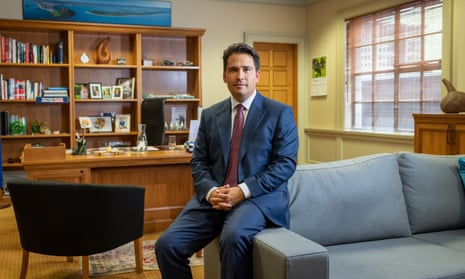He walked in the door at the same time as my cat, which heightened the impression that he looked like something the cat dragged in. It was the day after Simon Bridges had been rolled as leader of the National Party. I’d sent him a friendly text and he replied that he was in my neck of the woods the next day so maybe a cup of tea might be in order. I put on the jug. The occasion deserved a whiskey or something, but neither of us are social drinkers, or even very social.
Tea-drinking introverts make their own fun. We sat around my kitchen table that day in June 2020, and discussed what went down and what it all meant and where to next for Bridges, who had been in parliament since 2008. He didn’t make a lot of sense. He made rambling, vaguely coherent speeches, which mostly concluded with that profound assessment: “Whatever.” The knife in his back was still kind of visible, and it was easy to make out the fingerprints. He wasn’t bitter, but neither was he lighthearted; his future was at stake. Offers had already been made, he said, but he wasn’t in any hurry.
He’d take time out, he said. Cliches present as familiar shapes in the white-out conditions of trauma.
Life is one damned thing after another and I interrupted his sufferings to remark that I needed to get a few things for dinner at the corner shops. He said he’d walk with me, and get his driver to meet him there. We set off, and the fresh air did him some good. His mood brightened, and he was laughing about something when a teenager stepped out of the bakery with a mince pie, saw Bridges, and said, “Aw! I seen you on TV!”
Bridges said, “Yeah, you might of. Gidday. Simon Bridges.”
The name didn’t ring a bell. The kid shook his hand, and said, “Aw, but so like, who are you?”
It was a really good question. Bridges has set out these past two years to answer it in some kind of meaningful way. Public life in New Zealand has many second, lesser acts. Former prime minister John Key now sits on boards and floats around as some kind of wise old blathering eminence grise. Bridges’ deputy Paula Bennett, also deposed in that June 2020 coup, has reinvented herself as a not very chilled-out entertainer, hosting witless TV show Give Us A Clue. Bridges has chosen a different path: he’s remained in politics as the man who says what he thinks, but doesn’t take himself seriously. It’s a particularly New Zealand attitude and it’s worked wonders.
There was a terrible disconnect between Bridges the person as he really he is, and Bridges the opposition leader as he appeared in the media. The former has always been likeable, funny, a maverick; the latter was a risible Tory boor, stiff as a board, an anxious phoney. Thrown out as leader, he returned to a state of grace, and became himself.
“Maybe I’ll write a book,” he muttered that day over the teacups at my estate in Te Atatū, the watery West Auckland peninsula where Bridges was born and raised.
“No money in that, but OK,” I said, encouragingly.
He hadn’t given it much thought and it was just a vague notion. But when he texted just after Christmas saying that he had something he wanted to talk about over a beer (hard liquor!), I guessed what he had in mind.
In November, I’d commissioned Bridges to write a review of Gangland, a book about the killings and vast wealth involved in the methamphetamine trade, by the country’s best crime reporter, New Zealand Herald journalist Jared Savage.
He went at it with passion and huge enjoyment, and turned in a 3,000-word opus. “Thanks for the project,” he emailed. “Very cathartic for me in my wilderness years. Would love to find more things like this to do over time …”
He found it. After his text, we met at the Te Atatū RSA [Returned Serviceman’s Club] on a summer’s afternoon in late January and he explained that he’d spent Christmas writing a collection of essays. It sounded like memoir by stealth: he’d drawn on episodes in his own life to address issues such as race, class, masculinity, and parenting. The thing that struck me very forcefully was the way he talked about it: he was animated, excited, a man on a mission.
A few days later he sent a manuscript of 48,500 words. “If you would read it that would be hugely appreciated. Obviously if you think it’s crap that’s OK. Better to know now … Please don’t tell a soul.” I devoured most of it in a sitting: it was so easy to read, a completely honest and uncomplicated portrait of some of the things that have mattered most to his life, and his place in modern New Zealand society. It was surprising, candid, funny, vulnerable. I told him he was absolutely on the right track, and just needed to write more; it was definitely something that would find a publisher, and an audience.
National Identity is launched on Wednesday night. I will say a few words but the best insight into the author is provided by the author. As Bridges writes in the introduction: “I have come to realise I see myself as different, an outsider.”
Good book. Good guy.
Steve Braunias is a journalist and author who lives in Auckland, New Zealand
